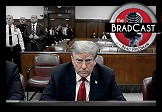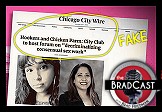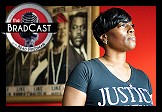 As I'm on the road and largely off the grid this week, I was about to post the following video from last night's Rachel Maddow Show, thanking her for covering so much of what we've been covering here at The BRAD BLOG, for so long, in one nice long top-of-show segment.
As I'm on the road and largely off the grid this week, I was about to post the following video from last night's Rachel Maddow Show, thanking her for covering so much of what we've been covering here at The BRAD BLOG, for so long, in one nice long top-of-show segment.
I'm still going to do that, but below that, I'm happy to post a press release just sent out by the non-partisan Brennan Center for Justice at NYU, breaking the news that a federal judge has issued a preliminary injunction blocking the "key provisions of a restrictive voting law in Florida today." The Brennan Center describes the ruling as "a breakthrough victory for Florida voters and voting rights advocates nationwide."
The new law, H.B. 1355, had included onerous criminal restrictions on third-party voter registration workers. The new rules were so onerous, in fact, that the League of Women Voters of Florida was forced to call off their registration drive in the state for the first time in 70 years. In the wake of the FL GOP's new law, high school teachers had been charged with crimes for registering their own students to vote, and a registration worker had received a threatening letter from the Sec. of State for turning in voter registrations one hour late after a holiday weekend.
U.S. District Court Judge Robert L. Hinkle blocked most of the FL law's new registration requirements today, finding they accomplished little more than suppressing the registration of new voters without serving any legitimate state interest. "If the goal is to discourage voter-registration drives and thus also to make it harder for new voters to register, this may work," wrote Hinkle in his frequently scathing decision [PDF].
The Brennan Center quotes from Hinkle's ruling this way: "Together speech and voting are constitutional rights of special significance; they are the rights most protective of all others, joined in this respect by the ability to vindicate one's rights in a federal court. … [W]hen a plaintiff loses an opportunity to register a voter, the opportunity is gone forever ... And allowing responsible organizations to conduct voter-registration drives --- thus making it easier for citizens to register and vote --- promotes democracy."
See the Brennan Center's full release today posted below. It's very good news, as once again another law passed by the GOP with the intention of nothing more than suppressing the vote of largely Democratic-leaning voters is found to be in violation of the Constitution and/or federal law, as has been the case with almost every single one of these GOP-passed laws over the past year --- at least when someone (too often not the U.S. Dept. of Justice, unfortunately) bothers to go to court to challenge them.
Yesterday, at Rolling Stone, Ari Berman had calculated that some 35,000 Florida voters stand to be purged this year if the Republicans' new voter suppression efforts there are carried out in full.
As to Rachel Maddow last night, here's some of the very important coverage she offered at the top of the show, including details on the state of Florida's current effort to purge thousands of legal voters from the rolls by claiming, inaccurately, that they are non-citizens. (NOTE: That effort is a separate voter suppression measure by Republicans in the state of Florida, and is not related to today's federal court ruling blocking the earlier voter suppression measure by Republicans in the state of Florida)...
For more on Charlie White, Indiana's Republican Sec. of State found himself to be guilty of three counts of felony voter fraud earlier this year, as mentioned by Maddow, start here. We've been covering that case for the past year or so. In that same article, you can also read a round up of some (though not all) of the latest high-profile Republicans who appear to have committed voter fraud themselves, including folks as high-profile as Mitt Romney, the GOP's presumptive nominee for President of the United States this year.
The story, mentioned by Maddow in the report above, of some 90% of Rep. Thaddeus McCotter (R-MI)'s signatures on his petition to be on the ballot this year being entirely fraudulent was new to me. But, as we noted when Newt Gingrich's campaign failed to qualify for the Virginia Presidential Primary ballot thanks to thousands of fraudulent signatures on his petitions, that is the exact same thing that the GOP has, for years, disingenuously described as "massive voter fraud" by ACORN when a handful of its tens of thousands of registration workers had turned in fraudulent signatures. The act was fraud of ACORN, not by it. Similarly, both McCotter and Gingrich were probably defrauded by the petition gatherers they hired. When it happens to them, of course, they are victims. But when it happens to ACORN, somehow, it amounts to Democrats stealing elections.
The percentage of fraudulent signatures turned in by ACORN workers was never as high as that turned in by the Gingrich and McCotter campaigns. Moreover, in the case of ACORN, the four-decade old community organization had verified and flagged most of them themselves as fraudulent before turning both them, and the names of the criminals over to authorities.
Like McCotter's campaign in Michigan, Gingrich's is also being investigated for criminal fraud violations in the state of Virginia by the state Attorney General there, as The BRAD BLOG reported exclusively earlier this year.
As to Florida Republican Gov. Rick Scott's new, blatant attempt to remove thousands of legal voters from the rolls by claiming they are non-citizens, Think Progress has done a great job covering the issue over the past week since we've been on the road and unable to cover here. You can start here for more on the 91-year old WWII vet told last week that he was a non-citizen and that he'd be removed from the rolls, despite his decades of voting, service to the country, and the Bronze Star he was awarded for his service during the Battle of the Bulge.
Scott's blatant efforts at a massive voter purge in the Sunshine State before the 2012 general election are so outrageous that, as the Miami Herald reported last week, the former Republican Sec. of State would not take part in it, after he had been unable to verify that the 182,000 names he was given by Scott himself were actually non-citizens.
And now, as promised, here's the breaking good news from the Brennan Center on the today's federal court ruling which blocks the bulk of the Florida law --- passed by the Republican legislature and signed by the Republican governor --- putting severe restrictions on both voter registration and early voting in the Sunshine State [emphasis in the original]...
For Immediate Release: May 31, 2012
New York, NY - A federal judge blocked enforcement of key provisions of a restrictive voting law in Florida today, a breakthrough victory for Florida voters and voting rights advocates nationwide.
The law, H.B. 1355, included onerous restrictions on community-based voter registration drives, forcing the League of Women Voters of Florida and other groups to shut down their drives. In his decision, U.S. District Judge Robert Hinkle found that the Constitution and federal law prohibit most of Florida's recently-passed restrictions, and highlighted the law's impact on the Plaintiffs' constitutional rights.
"Together speech and voting are constitutional rights of special significance; they are the rights most protective of all others, joined in this respect by the ability to vindicate one's rights in a federal court. … [W]hen a plaintiff loses an opportunity to register a voter, the opportunity is gone forever," U.S. Judge Robert L. Hinkle wrote in his opinion blocking most of the Florida law. "And allowing responsible organizations to conduct voter-registration drives-thus making it easier for citizens to register and vote-promotes democracy."
"Today's decision makes clear that laws that make it harder to participate in the political process should be rejected," said Wendy Weiser, director of the Democracy Program at the Brennan Center, and co-author of the report, Voting Law Changes in 2012. "Florida's law and others approved in the past year represent the most significant cutback in voting rights in decades. Today's decision will help turn the tide. Rather than erecting senseless barriers to voting, we should make our voting system work by upgrading our ramshackle voter registration system."
...
In 2011, a wave of suppressive laws passed that could make it significantly harder for millions of eligible Americans to cast ballots this fall, according to the Brennan Center's comprehensive study, Voting Law Changes in 2012.
The Florida decision marks the first time a federal court has blocked one of these restrictive voting laws, and comes after the Department of Justice, in a separate lawsuit, opposed Florida's law restricting voter registration and early voting. The Justice Department also rejected restrictive voter ID laws in South Carolina and Texas. A judge ruled that Wisconsin's voter ID law violated the state Constitution.
Widespread voting cutbacks could have a significant electoral impact in this year's hard-fought races. Minorities, poor, elderly, and young voters will likely be most affected.
Voting Law Changes in 2012 analyzes the 20 laws and two executive actions that passed in 15 states in 2011, as well as more than 100 bills that were introduced but did not pass (some may still pass). The study shows, among other things, that:
- The states that had cut back on voting rights will provide a majority of the electoral votes needed to win in 2012 and comprise a significant number of battleground states.
- Since the report's release in October 2011, three additional states have passed bills making it harder to vote (Pennsylvania, Mississippi, and Virginia), bills are currently pending in 12 states, and citizens in two states have succeeded in blocking restrictive laws.
"These voting law changes are radical and completely unnecessary. They especially hurt those who have been historically locked out of our electoral system - minorities, poor people, and students. Often they seem precisely targeted to exclude certain voters," said Lee Rowland, counsel for the Center's Democracy Program and one of the attorneys who argued the Florida case. "After the Florida election fiasco in 2000, it became clear that the rules of election administration could affect outcomes. This time, those rules are being altered in a way that will likely hurt millions."
Proponents of these laws assert they are needed to combat voter fraud. An earlier Brennan Center study, The Truth About Voter Fraud, showed that such in-person voter impersonation is exceedingly rare. "You are more likely to be struck by lightning than to commit in-person voter fraud," Weiser noted.
Read more about state law changes here.
Read more about how 11 percent, or more than 21 million, American citizens do not possess a government-issued photo ID in Citizens Without Proof, a Brennan Center publication.
CORRECTION: The initial headline for this article indicated that the court's ruling also dealt with Florida's new restrictions on early voting which decrease the days for early voting, and outlaw it all together on the Sunday before Election Day when many black church goers are said to vote. Today's ruling did not speak to that part of the new law.


 'Green News Report' 4/16/24
'Green News Report' 4/16/24
 Trump's First Criminal Trial, for Cheating in 2016, Begins in NY: 'BradCast' 4/15/24
Trump's First Criminal Trial, for Cheating in 2016, Begins in NY: 'BradCast' 4/15/24 Sunday 'Party Like It's 1864' Toons
Sunday 'Party Like It's 1864' Toons Biden Closes 'Gun Show Loophole'; Repubs Turn Desperate: 'BradCast' 4/11/24
Biden Closes 'Gun Show Loophole'; Repubs Turn Desperate: 'BradCast' 4/11/24  'Green News Report' 4/11/24
'Green News Report' 4/11/24 'Pink Slime': Fake 'Local News' Sites Proliferating in Advance of Election: 'BradCast' 4/10/24
'Pink Slime': Fake 'Local News' Sites Proliferating in Advance of Election: 'BradCast' 4/10/24 Dirty Tricks and the Dirtiest Candidate Of All Time: 'BradCast' 4/9/24
Dirty Tricks and the Dirtiest Candidate Of All Time: 'BradCast' 4/9/24 'Green News Report' 4/9/24
'Green News Report' 4/9/24 'Titanic Law' Reform Just Tip of Iceberg in Quest for Key Bridge Accountability: 'BradCast' 4/8/24
'Titanic Law' Reform Just Tip of Iceberg in Quest for Key Bridge Accountability: 'BradCast' 4/8/24 Sunday 'Dark Days Indeed' Toons
Sunday 'Dark Days Indeed' Toons Trump's Very Bad Day in Court(s), Other Good (& Less Good) News: 'BradCast' 4/4
Trump's Very Bad Day in Court(s), Other Good (& Less Good) News: 'BradCast' 4/4 'Green News Report' 4/4/24
'Green News Report' 4/4/24 WI Supremes May Restore Drop-Box Voting
WI Supremes May Restore Drop-Box Voting WI Voters Approve Election Crippling Ballot Measures: 'BradCast' 4/3/24
WI Voters Approve Election Crippling Ballot Measures: 'BradCast' 4/3/24  Politico's Josh Gerstein Owes a Retraction
Politico's Josh Gerstein Owes a Retraction More GOP Election Fraud; Overdue Justice for Crystal Mason: 'BradCast' 4/2/24
More GOP Election Fraud; Overdue Justice for Crystal Mason: 'BradCast' 4/2/24 Last Week Today with OG Bloggers:
Last Week Today with OG Bloggers: It's Up to You, New York: 'BradCast' 3/21/24
It's Up to You, New York: 'BradCast' 3/21/24 'It All Comes Down to Brett and Amy': 'BradCast' 3/20/24
'It All Comes Down to Brett and Amy': 'BradCast' 3/20/24 American 'Bloodbath': 'BradCast' 3/19/24
American 'Bloodbath': 'BradCast' 3/19/24
 VA GOP VOTER REG FRAUDSTER OFF HOOK
VA GOP VOTER REG FRAUDSTER OFF HOOK Criminal GOP Voter Registration Fraud Probe Expanding in VA
Criminal GOP Voter Registration Fraud Probe Expanding in VA DOJ PROBE SOUGHT AFTER VA ARREST
DOJ PROBE SOUGHT AFTER VA ARREST Arrest in VA: GOP Voter Reg Scandal Widens
Arrest in VA: GOP Voter Reg Scandal Widens ALL TOGETHER: ROVE, SPROUL, KOCHS, RNC
ALL TOGETHER: ROVE, SPROUL, KOCHS, RNC LATimes: RNC's 'Fired' Sproul Working for Repubs in 'as Many as 30 States'
LATimes: RNC's 'Fired' Sproul Working for Repubs in 'as Many as 30 States' 'Fired' Sproul Group 'Cloned', Still Working for Republicans in At Least 10 States
'Fired' Sproul Group 'Cloned', Still Working for Republicans in At Least 10 States FINALLY: FOX ON GOP REG FRAUD SCANDAL
FINALLY: FOX ON GOP REG FRAUD SCANDAL COLORADO FOLLOWS FLORIDA WITH GOP CRIMINAL INVESTIGATION
COLORADO FOLLOWS FLORIDA WITH GOP CRIMINAL INVESTIGATION CRIMINAL PROBE LAUNCHED INTO GOP VOTER REGISTRATION FRAUD SCANDAL IN FL
CRIMINAL PROBE LAUNCHED INTO GOP VOTER REGISTRATION FRAUD SCANDAL IN FL Brad Breaks PA Photo ID & GOP Registration Fraud Scandal News on Hartmann TV
Brad Breaks PA Photo ID & GOP Registration Fraud Scandal News on Hartmann TV  CAUGHT ON TAPE: COORDINATED NATIONWIDE GOP VOTER REG SCAM
CAUGHT ON TAPE: COORDINATED NATIONWIDE GOP VOTER REG SCAM CRIMINAL ELECTION FRAUD COMPLAINT FILED AGAINST GOP 'FRAUD' FIRM
CRIMINAL ELECTION FRAUD COMPLAINT FILED AGAINST GOP 'FRAUD' FIRM RICK SCOTT GETS ROLLED IN GOP REGISTRATION FRAUD SCANDAL
RICK SCOTT GETS ROLLED IN GOP REGISTRATION FRAUD SCANDAL VIDEO: Brad Breaks GOP Reg Fraud Scandal on Hartmann TV
VIDEO: Brad Breaks GOP Reg Fraud Scandal on Hartmann TV RNC FIRES NATIONAL VOTER REGISTRATION FIRM FOR FRAUD
RNC FIRES NATIONAL VOTER REGISTRATION FIRM FOR FRAUD EXCLUSIVE: Intvw w/ FL Official Who First Discovered GOP Reg Fraud
EXCLUSIVE: Intvw w/ FL Official Who First Discovered GOP Reg Fraud GOP REGISTRATION FRAUD FOUND IN FL
GOP REGISTRATION FRAUD FOUND IN FL


































